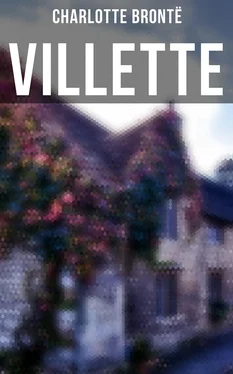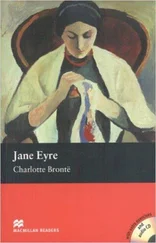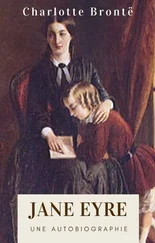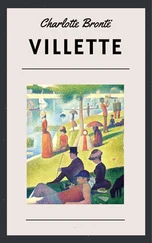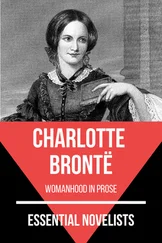The other lady passenger, with the gentleman-companion, was quite a girl, pretty and fair: her simple print dress, untrimmed straw-bonnet and large shawl, gracefully worn, formed a costume plain to quakerism: yet, for her, becoming enough. Before the gentleman quitted her, I observed him throwing a glance of scrutiny over all the passengers, as if to ascertain in what company his charge would be left. With a most dissatisfied air did his eye turn from the ladies with the gay flowers; he looked at me, and then he spoke to his daughter, niece, or whatever she was: she also glanced in my direction, and slightly curled her short, pretty lip. It might be myself, or it might be my homely mourning habit, that elicited this mark of contempt; more likely, both. A bell rang; her father (I afterwards knew that it was her father) kissed her, and returned to land. The packet sailed.
Foreigners say that it is only English girls who can thus be trusted to travel alone, and deep is their wonder at the daring confidence of English parents and guardians. As for the “jeunes Meess,” by some their intrepidity is pronounced masculine and “inconvenant,” others regard them as the passive victims of an educational and theological system which wantonly dispenses with proper “surveillance.” Whether this particular young lady was of the sort that can the most safely be left unwatched, I do not know: or, rather did not then know; but it soon appeared that the dignity of solitude was not to her taste. She paced the deck once or twice backwards and forwards; she looked with a little sour air of disdain at the flaunting silks and velvets, and the bears which thereon danced attendance, and eventually she approached me and spoke.
“Are you fond of a sea-voyage?” was her question.
I explained that my fondness for a sea-voyage had yet to undergo the test of experience; I had never made one.
“Oh, how charming!” cried she. “I quite envy you the novelty: first impressions, you know, are so pleasant. Now I have made so many, I quite forget the first: I am quite blasée about the sea and all that.”
I could not help smiling.
“Why do you laugh at me?” she inquired, with a frank testiness that pleased me better than her other talk.
“Because you are so young to be blasée about anything.”
“I am seventeen” (a little piqued).
“You hardly look sixteen. Do you like travelling alone?”
“Bah! I care nothing about it. I have crossed the Channel ten times, alone; but then I take care never to be long alone: I always make friends.”
“You will scarcely make many friends this voyage, I think” (glancing at the Watson-group, who were now laughing and making a great deal of noise on deck).
“Not of those odious men and women,” said she: “such people should be steerage passengers. Are you going to school?”
“No.”
“Where are you going?”
“I have not the least idea — beyond, at least, the port of Boue-Marine.”
She stared, then carelessly ran on:
“I am going to school. Oh, the number of foreign schools I have been at in my life! And yet I am quite an ignoramus. I know nothing — nothing in the world — I assure you; except that I play and dance beautifully, — and French and German of course I know, to speak; but I can’t read or write them very well. Do you know they wanted me to translate a page of an easy German book into English the other day, and I couldn’t do it. Papa was so mortified: he says it looks as if M. de Bassompierre — my godpapa, who pays all my school-bills — had thrown away all his money. And then, in matters of information — in history, geography, arithmetic, and so on, I am quite a baby; and I write English so badly — such spelling and grammar, they tell me. Into the bargain I have quite forgotten my religion; they call me a Protestant, you know, but really I am not sure whether I am one or not: I don’t well know the difference between Romanism and Protestantism. However, I don’t in the least care for that. I was a Lutheran once at Bonn — dear Bonn! — charming Bonn! — where there were so many handsome students. Every nice girl in our school had an admirer; they knew our hours for walking out, and almost always passed us on the promenade: ‘Schönes Mädchen,’ we used to hear them say. I was excessively happy at Bonn!”
“And where are you now?” I inquired.
“Oh! at — chose,” said she.
Now, Miss Ginevra Fanshawe (such was this young person’s name) only substituted this word “chose” in temporary oblivion of the real name. It was a habit she had: “chose” came in at every turn in her conversation — the convenient substitute for any missing word in any language she might chance at the time to be speaking. French girls often do the like; from them she had caught the custom. “Chose,” however, I found in this instance, stood for Villette — the great capital of the great kingdom of Labassecour.
“Do you like Villette?” I asked.
“Pretty well. The natives, you know, are intensely stupid and vulgar; but there are some nice English families.”
“Are you in a school?”
“Yes.”
“A good one?”
“Oh, no! horrid: but I go out every Sunday, and care nothing about the maîtresses or the professeurs, or the élèves, and send lessons au diable (one daren’t say that in English, you know, but it sounds quite right in French); and thus I get on charmingly…. You are laughing at me again?”
“No — I am only smiling at my own thoughts.”
“What are they?” (Without waiting for an answer) — “Now, do tell me where you are going.”
“Where Fate may lead me. My business is to earn a living where I can find it.”
“To earn!” (in consternation) “are you poor, then?”
“As poor as Job.”
(After a pause) — “Bah! how unpleasant! But I know what it is to be poor: they are poor enough at home — papa and mamma, and all of them. Papa is called Captain Fanshawe; he is an officer on half-pay, but well-descended, and some of our connections are great enough; but my uncle and godpapa De Bassompierre, who lives in France, is the only one that helps us: he educates us girls. I have five sisters and three brothers. By-and-by we are to marry — rather elderly gentlemen, I suppose, with cash: papa and mamma manage that. My sister Augusta is married now to a man much older-looking than papa. Augusta is very beautiful — not in my style — but dark; her husband, Mr. Davies, had the yellow fever in India, and he is still the colour of a guinea; but then he is rich, and Augusta has her carriage and establishment, and we all think she has done perfectly well. Now, this is better than ‘earning a living,’ as you say. By the way, are you clever?”
“No — not at all.”
“You can play, sing, speak three or four languages?”
“By no means.”
“Still I think you are clever” (a pause and a yawn).
“Shall you be sea-sick?”
“Shall you?”
“Oh, immensely! as soon as ever we get in sight of the sea: I begin, indeed, to feel it already. I shall go below; and won’t I order about that fat odious stewardess! Heureusement je sais faire aller mon monde.”
Down she went.
It was not long before the other passengers followed her: throughout the afternoon I remained on deck alone. When I recall the tranquil, and even happy mood in which I passed those hours, and remember, at the same time, the position in which I was placed; its hazardous — some would have said its hopeless — character; I feel that, as —
Stone walls do not a prison make,
Nor iron bars — a cage,
so peril, loneliness, an uncertain future, are not oppressive evils, so long as the frame is healthy and the faculties are employed; so long, especially, as Liberty lends us her wings, and Hope guides us by her star.
Читать дальше
